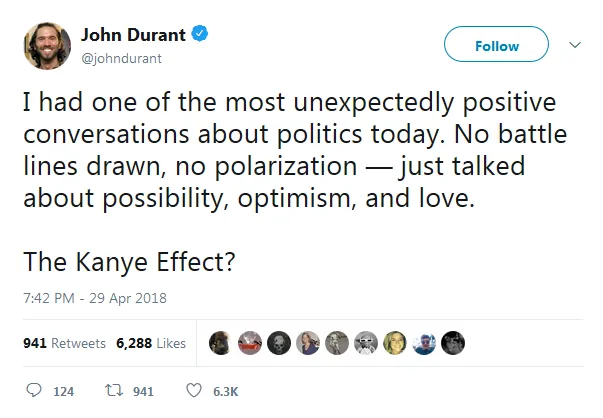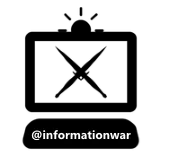
So, I was making my rounds on the interwebz today, as usual, trying to find out what the haps is. Sure enough, I found it! What it is, is a new terminology coined by a bestselling author called John Durant. Maybe you’ve heard of him? He authored ‘The Paleo Manifesto’. A recent tweet of his, as seen below, illustrates just exactly what ‘The Kanye Effect’ is.

My take from the tweet above, is that the Kanye Effect is all about possibility, love, and optimism. It’s about the ability to talk politics, or anything for that matter, without having your fight or flight instincts take over and ruin the whole dog gamned thing by allowing others to gain control over your emotions.
Implementing the Kanye Effect with E-Prime.
We're all navigating this world from within our own little reality bubbles, which are just as individual and unique as our personalities are. When we listen to people, many times they will unknowingly speak as if though they are the arbiters of truth, when in fact, they are the arbiters of their truth.
This can cause a lot of friction because, for the most part, people don’t like their realities defined for them. They’ve spent a long time constructing their reality bubbles and your new information, well, that could be a threat to their entire foundation of cognitive constructs.
So, they will vigorously defend their ideas of truth and it is this kind of response that usually results in arguments, name calling, etc. What we need to understand is that when someone attempts to lay claim to truth, that-that is their perception of things and everyone has a right to their own worldview.
If you are secure in your own thoughts, ideas, and beliefs, then other people’s perspectives, so long as it does not involve violating the liberty of others, should not be a threat to you, or your way of life.
So how can you talk to people in such a way that you don’t unconsciously threaten their reality? I would suggest that you indicate with your language that you are speaking from your perspective, and not try to redefine their reality. By doing this you acknowledge that you realize everyone has their own opinions and are entitled to them.
Below is an example:
"The red party is better than the blue party."
Speaking in such a way will almost definitely set the stage for argument. This is because, unless the person you are speaking agrees with you, they will take issue with what you said.
Whereas, if you said:
"Lately, to me, the red party seems to make more sense than the blue party, on several major issues."
A phraseology like that is far less abrasive and you have a better chance of cognitively infiltrating or influencing someone who has political beliefs that are the exact opposite of your own.
We live in some very divisive times, and if you earnestly want to influence people, then it would be wise to approach it with an honest attempt that doesn’t create a type of resistance that would make people cling even stronger to destructive belief systems.
I do not claim to be a master of this, and oftentimes find myself in heated exchanges. Yet, with a bit of practice, over time we can all become better and adopt new strategies to win the #informationwar.
It seems to me that the powers that be tend to use cognitive infiltration for all of the wrong reasons. However, that tool is a double-edged sword and can just as easily be wielded by people with good intentions. The primary goal should be to encourage people to question their beliefs.
Once people can move beyond the groupthink, they can begin to think for themselves. Many times, asking the right questions and giving people the space to think and answer is half of the battle. Kanye West is doing an excellent job at getting people to realize that it is more than okay to think for yourself.
Dragon Energy Manifesting Itself!
Gaslighting 101 with Marc Lamont Hill
There's a Disturbance in the Twitterverse
Twitterstorm: Candace Owens Appears on Fox News

